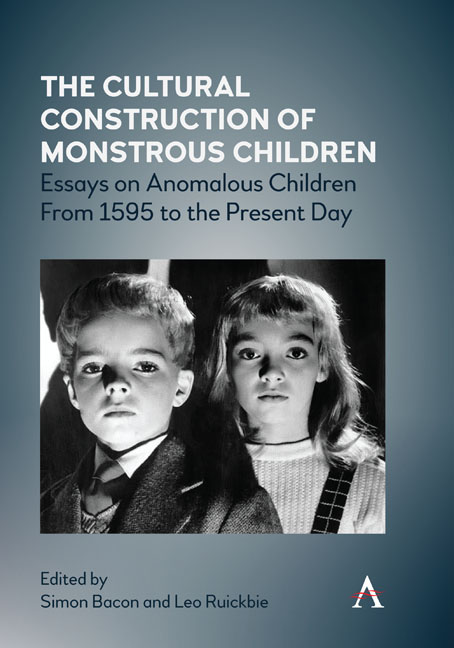 The Cultural Construction of Monstrous Children
The Cultural Construction of Monstrous Children Book contents
- Frontmatter
- Contents
- List of Illustrations
- Acknowledgements
- Introduction
- Part I Historical Case Studies
- Part II Factual Anxiety in Fictional Representations: The Undead Child
- Part III Factual Anxiety in Fictional Representations: The Monstrous Child
- Part IV Cultural Categorization in the Past, Present and Possible Future
- Notes on Contributors
- Index
Chapter Nine - Perverted Postmodern Pinocchios: Cannibalistic Vegetal-Children as Ecoterrorist Agents of the Maternal Imagination
Published online by Cambridge University Press: 20 January 2022
- Frontmatter
- Contents
- List of Illustrations
- Acknowledgements
- Introduction
- Part I Historical Case Studies
- Part II Factual Anxiety in Fictional Representations: The Undead Child
- Part III Factual Anxiety in Fictional Representations: The Monstrous Child
- Part IV Cultural Categorization in the Past, Present and Possible Future
- Notes on Contributors
- Index
Summary
From Early Modern Anxieties of Monstrous Maternal Imagination to Postmodern Fantasies of Ecoterrorist Vegetal Children
According to the early modern theory about the horrific creative powers of ‘maternal imagination’, widespread in Europe during the sixteenth to eighteenth centuries, the disordered emotional impressions of pregnant women were held responsible for the prevalence of ‘monstrous births’, based on the assumption that maternal thoughts could directly affect foetal development possibly resulting in congenital defects of their bodily organism. Infants born with spectacular physical anomalies were coined ominous wonders or freaks of nature (lusus naturae) and catalogued in wonder books, such as French physician Ambroise Pare's legendary On Monsters and Marvels that provided medical, judicial, religious and supernatural explanations for malformations. To mention some famous cases: in 1569, at Market Harborough, an unmarried domestic servant Agnes Bowker gave birth to a black cat fathered, she claimed, by a diabolical, shapeshifting beast who paid nightly visits to her in an out of her dreams; in 1719, an equally imaginative and excessively loquacious woman from Colme had triplets with four arms each, who came to the world speaking; in 1726, Mary Toft stated that the cause of her birthing a litter of rabbits was her failure to capture a rabbit she chased during her pregnancy and her insatiable yearning thereafter for rabbit meat she could not afford. Even Joseph Merrick (1862– 1890), the so-called Elephant Man, wrote in his autobiographical pamphlet that his gigantic deformity was brought about by his pregnant mother being frightened by a circus elephant. Some of these monstrous births were debunked by early modern scholars as hoaxes, tricks used by ‘beggars’ seeking sensation and life-long royal support assigned for the disabled, or became retrospectively interpreted either as cover for infanticide necessitated by the act to prevent the murdering of bastard offspring or as an opportunity for women to expand their reproductive lives and elude public disapproval and familial suspicion when birthing extramaritally conceived, ‘paternally non-mimetic’ offspring. However, the contemporary layman never doubted the veracity of these monstrosities, and opinions differed only insofar as these great curiosities would be fit to be presented to the Royal Society, or rather a veil should be drawn over them as imperfections in human nature, signs of the culpability of the community, harbingers of natural catastrophes or of God's wrath.
- Type
- Chapter
- Information
- The Cultural Construction of Monstrous ChildrenEssays on Anomalous Children from 1595 to the Present Day, pp. 151 - 164Publisher: Anthem PressPrint publication year: 2020


